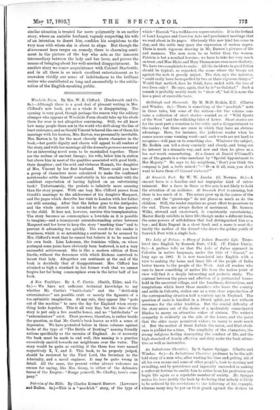A New Trafalgar. By A. C. Curtis. (Smith, Elder, and
Co. 6s.) — We have not sufficient technical knowledge to say whether Mr. Curtis's " battle-forts " and the "devil-ship exterminators" are possible craft or merely the figments of a too optimistic imagination. At any rate, they appear like " gods out of the machine " to save the day for England when every- thing looks hopeless. This is all very fine, but the date of the story is put only a few months hence, and no " battle-forts" or " exterminators " exist. Their prowess, therefore, is rather beside the question, so that Mr. Curtis's book leaves us with a sense of depression. We have protested before in these columns against books of the type of "The Battle of Dorking" naming friendly nations specifically as the enemies of England. As of necessity the book must be made to end well, this naming is a practice excessively uncivil towards our neighbours over the water. The story would be quite as exciting if the three foes were named respectively X, Y, and Z. This book, to be properly judged, should be reviewed by the First Lord, the Secretary to the Admiralty, and a naval engineer. It may be quite wrong in detail. All the same, the present writer always welcomes an excuse for saying, like Mrs. Gamp, to either of the defensive forces of the Empire: "Rouge yourself, Mr. Chuffey, here's com- pany."






































 Previous page
Previous page